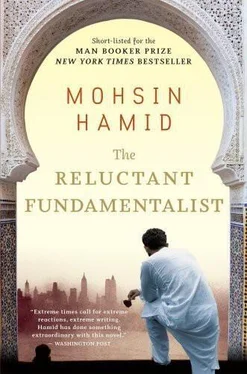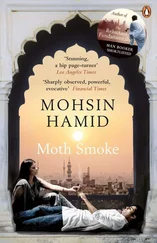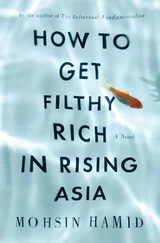It was not the first time Jim had spoken to me in this fashion; I was always uncertain of how to respond. The confession that implicates its audience is — as we say in cricket — a devilishly difficult ball to play. Reject it and you slight the confessor; accept it and you admit your own guilt. So I said, rather carefully, “Why did you not belong?” He smiled — again as if he could see right through me — and replied, “Because I grew up on the other side. For half my life, I was outside the candy store looking in, kid. And in America, no matter how poor you are, TV gives you a good view. But I was dirt poor. My dad died of gangrene. So I get the irony of paying a hundred bucks for a bottle of fermented grape juice, if you know what I mean.”
I thought about this. As I have already told you, I did not grow up in poverty. But I did grow up with a poor boy’s sense of longing, in my case not for what my family had never had, but for what we had had and lost. Some of my relatives held on to imagined memories the way homeless people hold onto lottery tickets. Nostalgia was their crack cocaine, if you will, and my childhood was littered with the consequences of their addiction: unserviceable debts, squabbles over inheritances, the odd alcoholic or suicide. In this, Jim and I were indeed similar: he had grown up outside the candy store, and I had grown up on its threshold as its door was being shut.
We were joined at the bar by other members of the team, but Jim sat with his arm around the back of my chair in a way that made me feel — quite literally — as though he had taken me under his wing. It was a good feeling, and it felt even better when I saw how the hotel staff was responding to him; they had identified Jim as a man of substance, and the smiles and attention he received were impressive to behold. I was the only non-American in our group, but I suspected my Pakistaniness was invisible, cloaked by my suit, by my expense account, and — most of all — by my companions.
And yet…. No, I ought to pause here, for I think you will find rather unpalatable what I intend to say next, and I wish to warn you before I proceed. Besides, my throat is parched; the breeze seems to have disappeared entirely and, although night has fallen, it is still rather warm. Would you care for another soft drink? No? You are curious, you say, and desire me to continue? Very well. I will just signal our waiter to bring a bottle for me; there, it is done. And here he comes, making such haste; one would think we were his only customers! Ah, delicious: this is precisely what I required.
The following evening was supposed to be our last in Manila. I was in my room, packing my things. I turned on the television and saw what at first I took to be a film. But as I continued to watch, I realized that it was not fiction but news. I stared as one — and then the other — of the twin towers of New York’s World Trade Center collapsed. And then I smiled. Yes, despicable as it may sound, my initial reaction was to be remarkably pleased.
Your disgust is evident; indeed, your large hand has, perhaps without your noticing, clenched into a fist. But please believe me when I tell you that I am no sociopath; I am not indifferent to the suffering of others. When I hear of an acquaintance who has been diagnosed with a serious illness, I feel — almost without fail — a sympathetic pain, a twinge in my kidneys strong enough to elicit a wince. When I am approached for a donation to charity, I tend to be forthcoming, at least insofar as my modest means will permit. So when I tell you I was pleased at the slaughter of thousands of innocents, I do so with a profound sense of perplexity.
But at that moment, my thoughts were not with the victims of the attack — death on television moves me most when it is fictitious and happens to characters with whom I have built up relationships over multiple episodes — no, I was caught up in the symbolism of it all, the fact that someone had so visibly brought America to her knees. Ah, I see I am only compounding your displeasure. I understand, of course; it is hateful to hear another person gloat over one’s country’s misfortune. But surely you cannot be completely innocent of such feelings yourself. Do you feel no joy at the video clips — so prevalent these days — of American munitions laying waste the structures of your enemies?
But you are at war, you say? Yes, you have a point. I was not at war with America. Far from it: I was the product of an American university; I was earning a lucrative American salary; I was infatuated with an American woman. So why did part of me desire to see America harmed? I did not know, then; I knew merely that my feelings would be unacceptable to my colleagues, and I undertook to hide them as well as I could. When my team gathered in Jim’s room later that evening, I feigned the same shock and anguish I saw on the faces around me.
But hearing them speak of their loved ones, my thoughts turned to Erica, and I no longer needed to pretend. I did not yet know, of course, that the dying was confined to the limited geography of what would come to be called Ground Zero. Nor did I yet know that Erica was safely at home when the attacks took place. I was almost relieved to be worried for her and unable to sleep; this allowed me to share in the anxiety of my colleagues and ignore for a time my initial sense of pleasure.
We were unable to leave Manila for several days, on account of flights being canceled. At the airport, I was escorted by armed guards into a room where I was made to strip down to my boxer shorts — I had, rather embarrassingly, chosen to wear a pink pair patterned with teddy bears, but their revelation had no impact on the severe expressions of my inspectors — and I was, as a consequence, the last person to board our aircraft. My entrance elicited looks of concern from many of my fellow passengers. I flew to New York uncomfortable in my own face: I was aware of being under suspicion; I felt guilty; I tried therefore to be as nonchalant as possible; this naturally led to my becoming stiff and self-conscious. Jim, who was sitting next to me, asked on multiple occasions if I was all right.
When we arrived, I was separated from my team at immigration. They joined the queue for American citizens; I joined the one for foreigners. The officer who inspected my passport was a solidly built woman with a pistol at her hip and a mastery of English inferior to mine; I attempted to disarm her with a smile. “What is the purpose of your trip to the United States?” she asked me. “I live here,” I replied. “That is not what I asked you, sir,” she said. “What is the purpose of your trip to the United States?” Our exchange continued in much this fashion for several minutes. In the end I was dispatched for a secondary inspection in a room where I sat on a metal bench next to a tattooed man in handcuffs. My team did not wait for me; by the time I entered the customs hall they had already collected their suitcases and left. As a consequence, I rode to Manhattan that evening very much alone.
But why do you flinch? Ah yes, the bats; they are circling rather low. They will not touch us; allow me to reassure you on that score. You know, you say? Your tone is curt; I can see that I have offended you, angered you even. But I have not, I suspect, entirely surprised you. Do you deny it? No? And that is of not inconsiderable interest to me, for we have not met before, and yet you seem to know at least something about me. Perhaps you have drawn certain conclusions from my appearance, my lustrous beard; perhaps you have merely followed the arc of my tale with the uncanny skill of a skeet shooter; or perhaps…. But enough of these speculations! Let us cast our gaze over a menu; I have spoken too much, and I fear I have been negligent in my duties as a host. Besides, I wish now to hear more of you: what brings you to Lahore, what company you work for, et cetera, et cetera. Night is deepening around us, and despite the lights above this market, your face is mostly in shadow. Let us, like the bats, exercise our other senses, since our eyes are of diminishing utility. Your ears must be exhausted; the time has come to employ your tongue — for taste, if nothing more, although I hope you can be persuaded to speak!
Читать дальше












